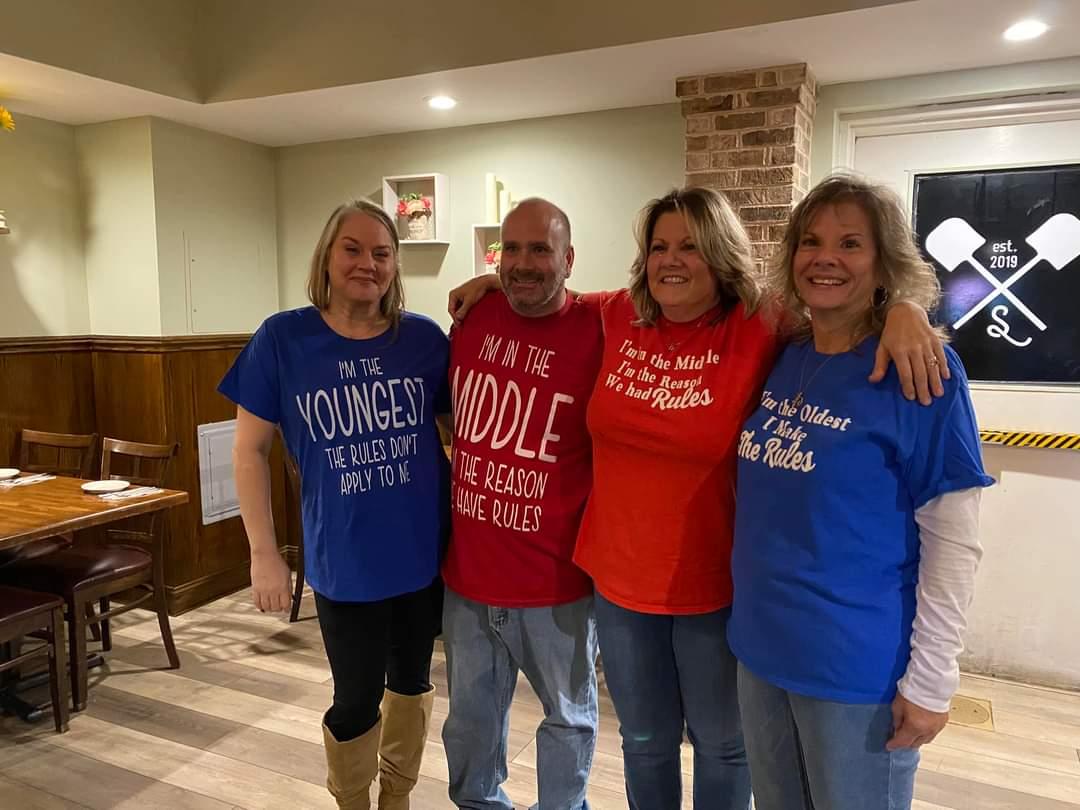Stephanie McKenna, 34, settled into her seat as her plane began its descent into Phoenix, Arizona.
Thirty-six thousand feet below, Tom Chaney, a Marine Veteran and Stephanie’s newfound biological father, made his way to the arrivals terminal of the Phoenix Sky Harbor International Airport to greet her for the first time.
Father and daughter shared an instant bond. “We have so many similarities. It’s not even funny. It is ridiculous,” Tom said.
Their emotional meeting was months in the making. And it started with a Christmas gift.
After expressing interest in learning more about her identity, Stephanie’s adoptive parents gave her a 23andMe kit for Christmas. That led Stephanie to her biological grandfather and, ultimately, to Tom.
For many customers, the gift of 23andMe has been the gift of a lifetime. Some, like Stephanie, have discovered family members. Some have experienced a new sense of connection and belonging. Still others have learned valuable health information that has allowed them to make informed choices. Here are a few of their stories.

The Gift of Family
In September 1988, just four months after Melanie Pressley made the wrenching decision to put her infant son up for adoption, she received a letter from his adoptive parents that put her mind — and heart — at ease.
“Dear Birth Mom of ‘Our’ Baby,” it began. “Please, if you ever wonder about him, know he is loved and we will strive as hard as possible to be good parents.”
“It made me feel like I had done the right thing,” Melanie said.
As the years passed, Melanie got married, had three children, and put down roots in Ohio. But she never stopped wondering about the child she gave up, and she harbored hope that they would one day reconnect.
A combined Mother’s Day and birthday gift of 23andMe helped to realize that dream. Melanie’s report showed a DNA match with someone who might be her son — 32-year-old Greg Vossler. She immediately reached out. The two began communicating regularly via email and text and they finally met in person at Melanie’s home this year.
“Melanie’s family coming into my life at this point has been a blessing,” Greg told Fox News.
“It’s kind of re-ignited some passions and excitement.”

The Gift of Connection
In many ways, Katie Ares, Leigh Ann Baglin, and Scott McCreary are typical siblings. They’re comfortable with each other and share an easy camaraderie. They talk frequently — trading details, stories, and updates about their lives.
But unlike most brothers and sisters, up until a few years ago, the siblings didn’t know each other existed.
Now in their 30s, the three were all born in South Korea and adopted separately by families in the United States. It was by chance that they each used 23andMe.
Katie received a 23andMe kit as a gift from her employer.
“I didn’t have any expectations from it,” Katie said. “I just thought, ‘OK, this is neat. It’s interesting. I wonder if anything’s going to come of it.’:
Something did come of it. Opting-in and using 23andMe’s DNA Relatives tool, Katie connected with her sister Leigh Ann and brother Scott for the first time.
Scott described the experience: “It’s just absolutely insane meeting these people that you’ve never known your whole life, but when you meet them, you fall right into place, just like you have been together your entire life.”
What’s next for the trio? Catching up on lost time. They spent a weekend in Phoenix and hope to plan more trips soon. Finally being together was “amazing and so fun,” Leigh Ann said. “It was a short but very sweet trip.”

The Gift of Knowledge
On Christmas morning in 2018, Margaret Fox tore the wrapping paper off a present to discover a 23andMe Health + Ancestry kit. Her family had all chipped in to buy the kits for each other.
“We thought it would be a fun thing to take,” explained Mollie Gelburd, Margaret’s sister. “We were never expecting it would end up leading to any sort of clinical change.”
Two months later, Margaret received an email from 23andMe letting her know her reports were ready. After opting in to receive her health information and going through educational modules about the reports, she opened her BRCA1/BRCA2 (Selected Variants) Genetic Health Risk Report.* It indicated she had one of the three variants for which 23andMe tests. Margaret, who was only 28 at the time, was stunned. She was aware of her family’s Ashkenazi Jewish heritage, and she had a great aunt who had battled breast and ovarian cancer, but she “never believed it was something to be overly concerned about.”
Females with one of the three variants 23andMe tests for — no matter their ancestry — have an increased risk of developing certain cancers including breast and ovarian. Armed with this knowledge, Margaret sprang into action. She set up an appointment with her general practitioner who referred her to a genetic counselor for follow-up testing. When her tests confirmed what she learned in 23andMe’s report, Margaret began receiving regular breast radiology checkups. This preventative monitoring continued for nearly 18 months until one day she felt a small, painful lump in her breast. She was eventually diagnosed with Stage 2 breast cancer.
Margaret was immediately connected to an oncologist and a surgeon and began IVF treatments to preserve her fertility.
Today she is partway through a 16-week course of chemotherapy and the prognosis, her sister said, looks good.
Margaret acknowledged that her journey is not the “traditional 23andMe success story.” “But in a way, it is,” she said. “This is about survival. We caught this early.”
Mollie agreed: “I often think about how grateful I am for 23andMe’s health test results, which notified us of her status and enabled her to engage in screenings she likely would not have pursued. As a result of this test, her doctors were able to catch her cancer before it spread beyond the breast. I can’t help but think that the health results from 23andMe may have saved my sister’s life.”

This holiday season, give the most meaningful gift you can — 23andMe.
*23andMe health predisposition reports include both reports that meet FDA requirements for genetic health risks and reports which are based on 23andMe research and have not been reviewed by the FDA. The test uses qualitative genotyping to detect select clinically relevant variants in the genomic DNA of adults from saliva for the purpose of reporting and interpreting genetic health risks. It is not intended to diagnose any disease. Your ethnicity may affect the relevance of each report and how your genetic health risk results are interpreted. Each genetic health risk report describes if a person has variants associated with a higher risk of developing a disease, but does not describe a person’s overall risk of developing the disease. The test is not intended to tell you anything about your current state of health, or to be used to make medical decisions, including whether or not you should take a medication, how much of a medication you should take, or determine any treatment. For certain conditions, we provide a single report that includes information on both carrier status and genetic health risk. Warnings & Limitations: The 23andMe PGS Genetic Health Risk Report for BRCA1/BRCA2 (Selected Variants) is indicated for reporting of the 185delAG and 5382insC variants in the BRCA1 gene and the 6174delT variant in the BRCA2 gene. The report describes if a woman is at increased risk of developing breast and ovarian cancer, and if a man is at increased risk of developing breast cancer or may be at increased risk of developing prostate cancer. The three variants included in this report are most common in people of Ashkenazi Jewish descent and do not represent the majority of BRCA1/BRCA2 variants in the general population. This report does not include variants in other genes linked to hereditary cancers and the absence of variants included in this report does not rule out the presence of other genetic variants that may impact cancer risk. The PGS test is not a substitute for visits to a healthcare professional for recommended screenings or appropriate follow-up. Results should be confirmed in a clinical setting before taking any medical action. For important information and limitations regarding each genetic health risk report, visit 23andme.com/test-info/.




